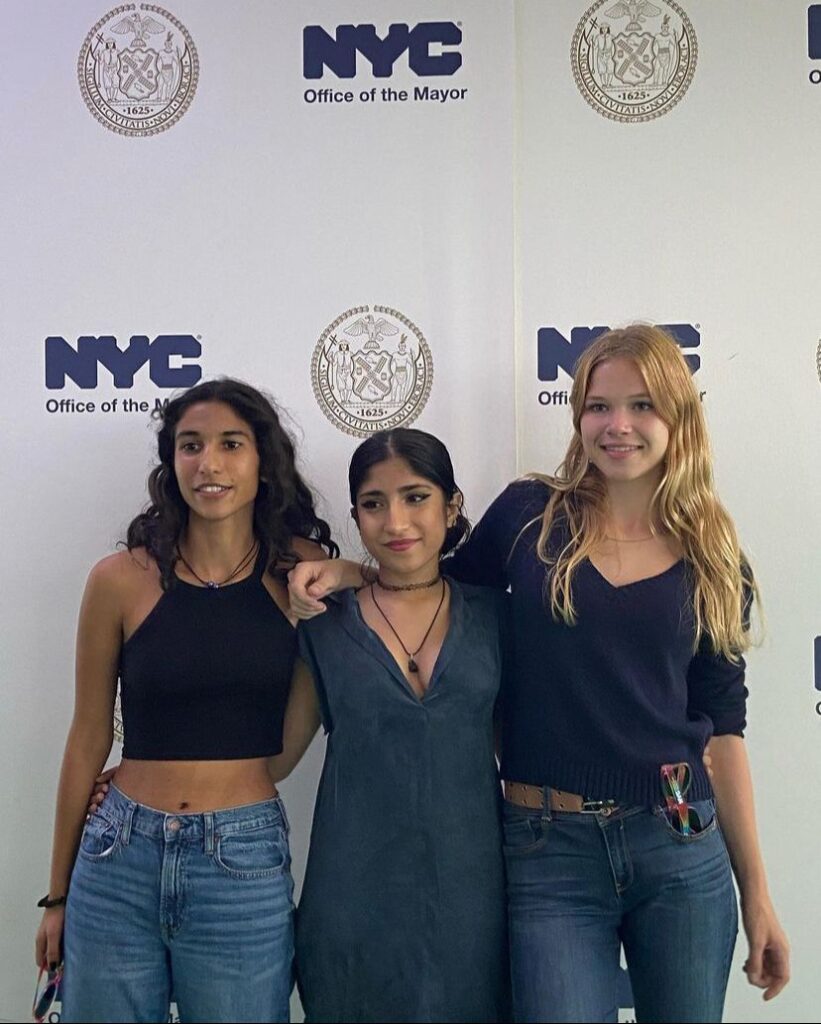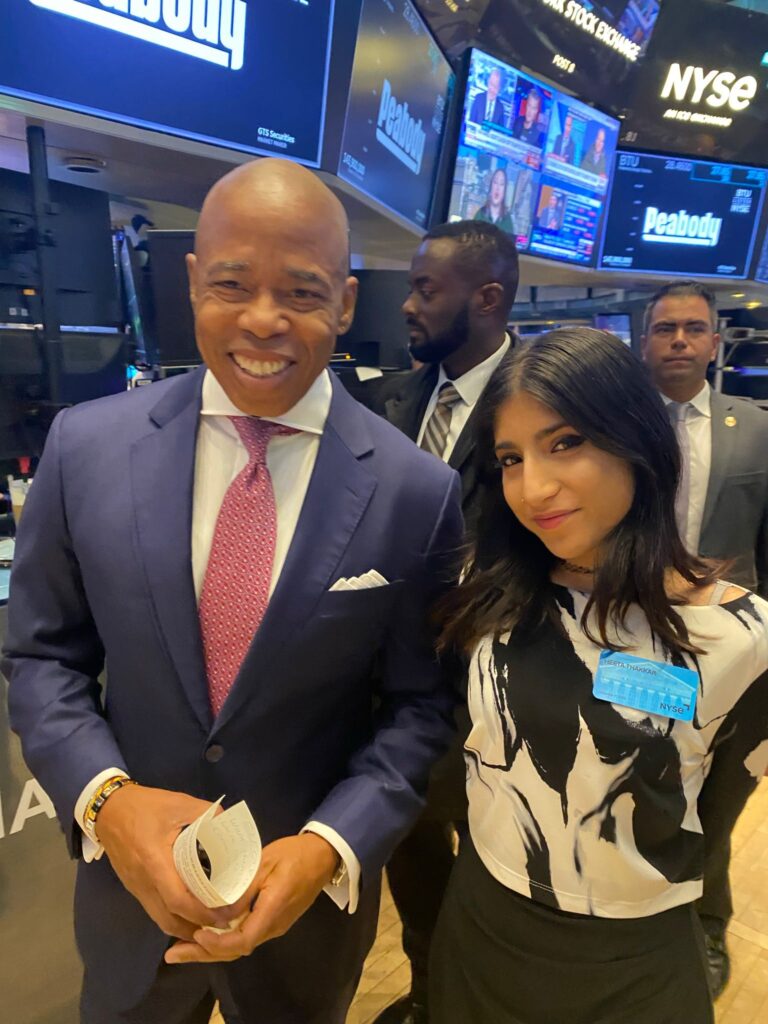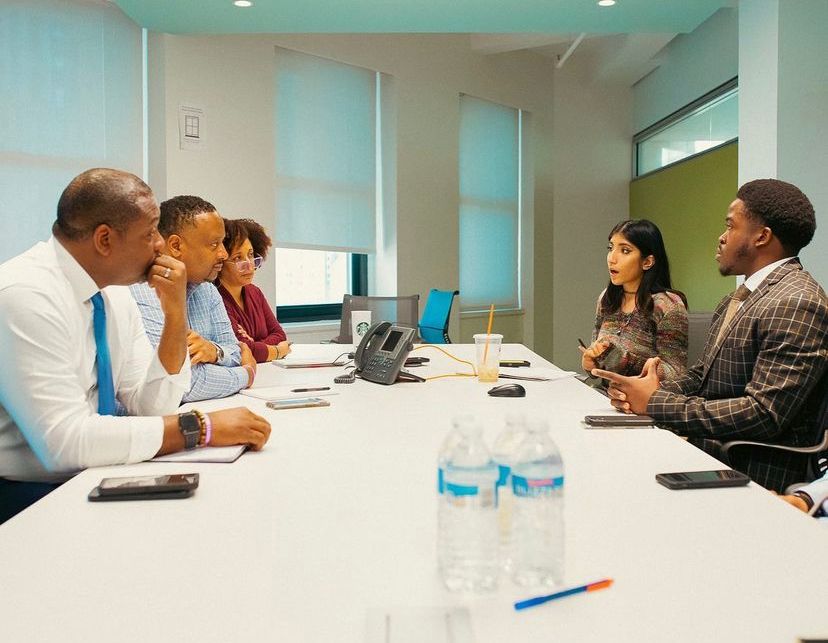
“Living in NYC, our government is honestly so beautiful,” says Environmental Activist Heeta Thakkar, who founded Zero Waste Schools (ZWS), a student-run organization that provides waste management solutions to NYC schools.
Thakkar’s appearance is unassuming—a pair of blue jeans and a black winter coat hardly indicative of the fire in her belly. But her ambition comes to light as soon as she begins to speak. “Hopefully, I can become the mayor of New York City one day, but I want to go bigger. I want to be the house speaker or even the president. Hell yeah!” she says, tapping her right fist on the table with ecstatic energy as we converse inside one of NYU Bobst Library’s meeting rooms.
Thakkar is part of Young Future Leaders, a youth advisory committee under the mayor’s office that researches solutions for various socio-economic issues like gun violence and climate. She’s also working with New York State lawmakers to pass a new bill focused on eliminating excess food waste at supermarkets to help solve food insecurity problems for the homeless population in the city.
Born to Indian immigrant parents, Thakkar hails from Queens and attends the Bronx High School of Science. She hopes to study public policy at Georgetown University. At the end of our conversation, I am convinced that if she ran for president in the future, she would have my vote.
Q: I’ve never heard the words government and beautiful in the same sentence.
A: It’s about the institutions we have, about the power a person can yield. I want to go into public policy. Everybody is like, “The government is so corrupt,” and I’m like, “Exactly!” That’s why I want to be the change we want to see.
There’s a reason so many women and black people died for voting rights. Being able to vote gives you power; it gives you a voice. People have worked hard for disadvantaged people to vote and have a voice. That’s why I think the government is beautiful.
Q: Is Zero Waste Schools a volunteer group? Or a registered organization?
A: We are registered with the IRS and NYS, we have the whole works, and we pay our taxes. My team comprises people I know, but we have branched out a lot. I have people from different colleges, and we also have an advisory board with established people in public policy and social reform. We raise funds for donations. Right now, we plan to donate $20,000 worth of waste management infrastructure to my school.
Q: What kind of infrastructure do you mean?
A: By infrastructure, I mean fancy trash cans. A lot of that has to do with recycling the right way or composting the right way has to do with the infrastructure itself—if it’s open top, if it’s closed, the labeling on it, the colors associated with it.
Q: How do you engage students with your cause?
A: We have an ambassadorship program within the school. Students hold school poster contests and get service credits for those who win posters, like where to recycle and how to properly manage your waste.
All schools in NYC are mandated to have a staff member as a sustainability director, and they have student green teams under them. So, we collaborate with them.
Q: Are you working with other schools apart from yours?
A: We are working with Jefferson High School and Museum School. We’re doing similar programs with them.
Q: I saw pictures of you with Mayor Eric Adams on your Instagram page. Can you talk a bit more about that?
A: My dad heads the AIA, Association of Indians in America. He was hosting his annual Diwali festival, and the mayor was invited. And speaking to the mayor, I was like, I’m doing this. What are you doing for the environment? Like what legislation? What are you doing within the city? He was like, I don’t have time for this, but I like you. So, he gave me his number and went away.

Q: I would brag about that so much.
A: I’m not bragging because everybody would ask me about it, and then I would be awkward. But then that’s how he put me in touch with Young Future Leaders, and we work with the Department of Community and Youth Development. Through them, we get in touch with many schools and community centers. It’s important to work with the government. It’s important to know what’s out there.
Q: Tell me more about the other committee members.
A: It’s a beautiful group. I’m the youngest. Everybody is pushing for some reform. They’ll be passionate about anything if it betters their communities. Most people on that board are black, and I’m the only brown person.
It’s beautiful to see people of color empowered. Because for a long time in history, we haven’t seen that, which goes back to my point about why the government is so beautiful because there can be good people in power.
Q: How does New York recycle its waste?
A: Most of our trash goes into landfills, not in NYC, because NYC ran out of landfills long ago. Our waste gets transported to Connecticut and New Jersey. For our recycling, the city contracts with certain recycling plants.
I want to work with the Department of Sanitation for composting. NYC had curbside composting. Then COVID-19 came around, and because of budget cuts, they took composting away. But right now, they brought it back to Queens. And then also select neighborhoods in Brooklyn and in Manhattan.
Q: Apart from working with schools, what else are you doing?
A: We’re working in public policy with Assembly Member Edward Gibbs to propose a New York State legislature bill to mandate supermarkets to donate their edible food waste to food pantries and local homeless shelters. We got that idea from London, where it is mandated.
Q: So, you’re saying NY has no mandate for the management of excess food at supermarkets?
A: The bill in New York State is bullshit. The words are literally, supermarkets may choose to do this. So, the excess edible waste just goes to the landfill. NYC has such a high homeless population who lives with food insecurity. It’s bad for our people. It’s terrible for the environment. Who do you think you are? And what are you doing?
Trader Joe’s donates their edible food excess. There are some incentives. So, we’re working towards a mandate, incentivizing people who want to do it and disincentivizing those who don’t.
Q: How do you balance work and studies?
A: It’s a sacrifice for my education and personal life. But it’s beautiful. It taught me about working, ethics, and allocating my time. I’m willing to be able to give up things because I know that is what makes a difference. Education is important, but so is having a passion.








